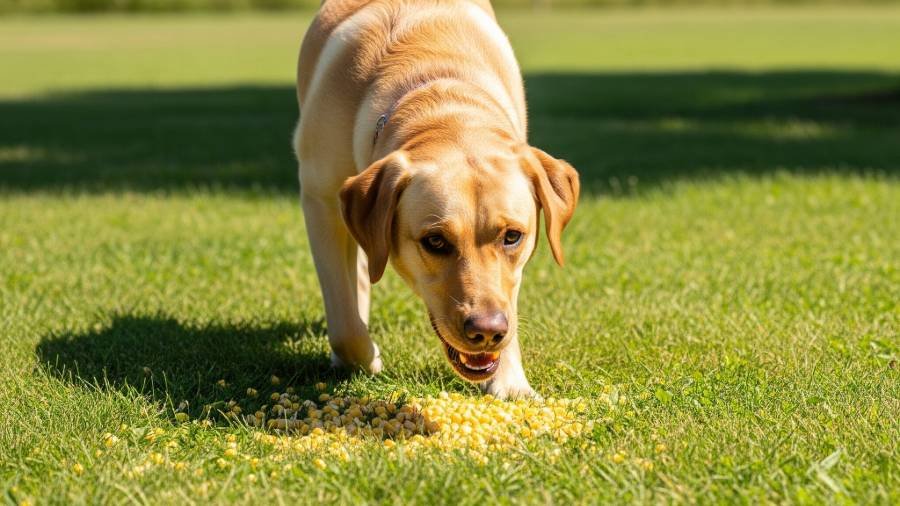Yes, dogs can eat blueberries as a healthy snack that’s safe for dogs to eat, offering a range of health benefits when included in moderation.
As a nutrient-rich addition to a dog’s diet, fresh or frozen blueberries can complement their regular dog food.

Potential Benefits of Blueberries for Dogs
When dogs can eat blueberries in small amounts, they provide several advantages that enhance a dog’s diet:
- Vitamins and Minerals: Blueberries are rich in vitamin C, K, and antioxidants, supporting the immune system and overall wellness.
- High in Fiber: The natural fiber aids digestion and helps maintain a balanced diet, preventing constipation.
- Antioxidant Power: These berries combat free radicals, potentially reducing aging effects and supporting brain health.
- Low-Calorie Treat: With minimal calories, blueberries serve as a guilt-free snack for small dogs or those watching their weight.
- Hydration Boost: Fresh blueberries contribute moisture, aiding hydration alongside regular water intake.
These benefits of blueberries for dogs shine when you feed your dog a small amount as an occasional treat. For more on safe fruits, explore what fruits can dogs eat.
Risks and Dangers of Blueberries for Dogs
While blueberries are safe for dogs, some risks should be noted if not managed properly:
- Choking Hazard: Whole blueberries can pose a risk, especially for small dogs or puppies if swallowed without chewing.
- Upset Stomach: Overfeeding can lead to diarrhea or gastrointestinal discomfort due to high fiber content.
- Added Sugars: Blueberries with added sugars (e.g., in processed forms) can cause weight gain or diabetes risk.
- Allergic Reactions: Though rare, some dogs may experience mild allergies, showing signs like itching or ear issues.
- Nutritional Imbalance: Relying heavily on blueberries can displace essential nutrients from dog food.
- Pesticide Exposure: Non-organic berries may carry residues, requiring thorough washing.
How to Safely Feed Blueberries to Dogs
To ensure blueberries are a safe treat, follow these guidelines when feeding blueberries to your dog:
- Wash Thoroughly: Rinse fresh blueberries under water to remove pesticides, even if organic, before serving.
- Cut or Mash: For small dogs or puppies, halve or mash blueberries to reduce choking hazard.
- Use Plain: Offer fresh or frozen blueberries without added sugars, syrups, or toppings.
- Feed in Moderation: Limit to a small amount (e.g., 5-10 berries for small dogs, up to 20 for larger breeds) once or twice a week, keeping treats under 10% of a dog’s daily intake.
- Monitor Reactions: Introduce blueberries gradually and watch for digestive upset or allergies over 24-48 hours. Consult a vet if issues arise.
- Avoid Processed Forms: Steer clear of canned or sweetened blueberry products, which can harm a dog’s health.
- Consult a Vet: Seek veterinary advice before adding blueberries, especially for dogs with diabetes or digestive sensitivities.
Signs of Blueberry-Related Issues
If a dog eats blueberries excessively or reacts poorly, look for these warning signs:
- Vomiting, diarrhea, or reduced appetite (possible upset stomach)
- Excessive scratching or ear infections (rare allergic reactions)
- Difficulty swallowing or choking (from whole berries)
- Lethargy or unusual behavior (nutritional imbalance)
- Abdominal discomfort or bloating (overfeeding)
If these signs appear, stop feeding blueberries and contact a veterinarian immediately. Severe reactions may need veterinary attention.
Expert Opinions
Veterinary experts, including the American Kennel Club (AKC) and the Pet Poison Helpline, confirm that dogs can eat blueberries safely in moderation, praising their antioxidant and vitamin content. The AKC recommends washing and cutting berries for small dogs, cautioning against overfeeding. For more on safe snacks, check can dogs eat strawberries.
Additional Considerations
- Health Conditions: Dogs with diabetes or gastrointestinal issues should limit blueberries due to sugar and fiber. Consult a vet first.
- Puppies: Young dogs may need mashed berries to avoid choking; monitor closely.
- Dog Preferences: Many dogs enjoy the burst of flavor from fresh blueberries, while others may not. If uninterested, try can dogs eat apples.
- Organic vs. Non-Organic: Organic blueberries may reduce pesticide risk, but all should be washed.
- Storage: Keep fresh blueberries refrigerated and use within a week; frozen blueberries are a convenient alternative.
- Seasonal Treat: Blueberries are a perfect summer healthy snack, complementing regular dog food.
Safe Treat Alternatives
Instead of blueberries, consider these safe-for-dogs treats, tailored to enhance a dog’s diet:
- Cooked Turkey: Plain, unseasoned turkey bits provide lean protein.
- Carrots: Small, raw carrot sticks support dental health.
- Apples: Sliced, seedless apple pieces offer vitamins.
- Plain Pumpkin: A teaspoon of cooked pumpkin aids digestion.
Introduce new treats gradually, monitor for reactions, and consult a vet to ensure a balanced dog’s diet.
Dogs can eat blueberries as a safe, healthy snack packed with vitamins and minerals, offering health benefits like immune system support and high in fiber when fed in moderation.
However, risks such as choking hazard, upset stomach from overfeeding, or pesticide exposure require washing, cutting (for small dogs), and portion control.
Puppies or dogs with health conditions like diabetes should avoid excessive blueberries unless approved by a vet, and a balanced diet should remain the priority.
Always consult a veterinarian before feeding blueberries to your dog or introducing other fruits, and consider safe alternatives. For more on canine nutrition, explore can dogs eat bananas, can dogs eat watermelon, or what vegetables can dogs eat.
For additional questions about what dogs can eat or dietary plans, feel free to ask!





